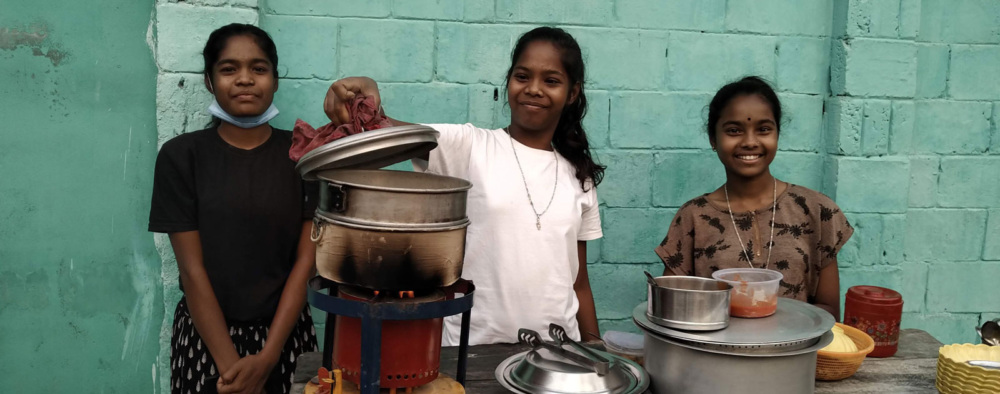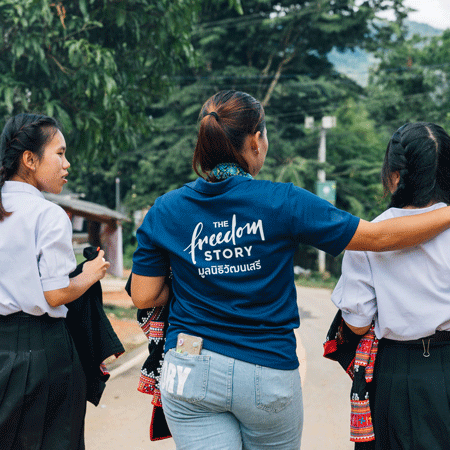
Sécurité et bien-être
En collaboration avec des partenaires communautaires du monde entier, nous pouvons créer un changement significatif pour les enfants, les jeunes et les communautés — en améliorant l'éducation et l'accessibilité et en réduisant la violence, en particulier à l'égard des filles.
Chaque don compte et cet hiver, chaque don sera doublé grâce à un programme de dons jumelés de $10 000 !
Sécurité et bien-être
Bien que l'industrie indienne du thé, tournée vers l'exportation, existe depuis plus de 180 ans, elle est loin d'être stable. Cela a de graves conséquences pour les travailleurs du thé, qui dépendent de cette industrie à forte intensité de main-d'œuvre pour survivre.
Au total, 80% des travailleurs du thé sont des femmes, et la plupart appartiennent à des communautés adivasi (tribales). La plupart vivent avec leur famille dans les plantations de thé, où le thé est cultivé.
Depuis le début du siècle, on observe une tendance constante à la fermeture des plantations de thé dans la région sub-himalayenne du Bengale-Nord. De plus, plusieurs plantations de cette région sont « malades », c'est-à-dire qu'elles ne fonctionnent pas régulièrement. Certains mois, il y a du travail, d'autres, il n'y en a plus, laissant les travailleurs du thé et leurs familles dans une situation précaire.
Les effets de la fermeture des plantations de thé ou de la « maladie » touchent directement les travailleurs des plantations de thé et les membres de leur famille, en particulier leurs enfants, qui sont déjà vulnérables parce qu’ils appartiennent à des secteurs socialement et économiquement marginalisés de la société.
[image_caption caption=”Enfants participant à une séance de Rural Aid sur les droits de l’enfant. © Rural Aid” float=””]
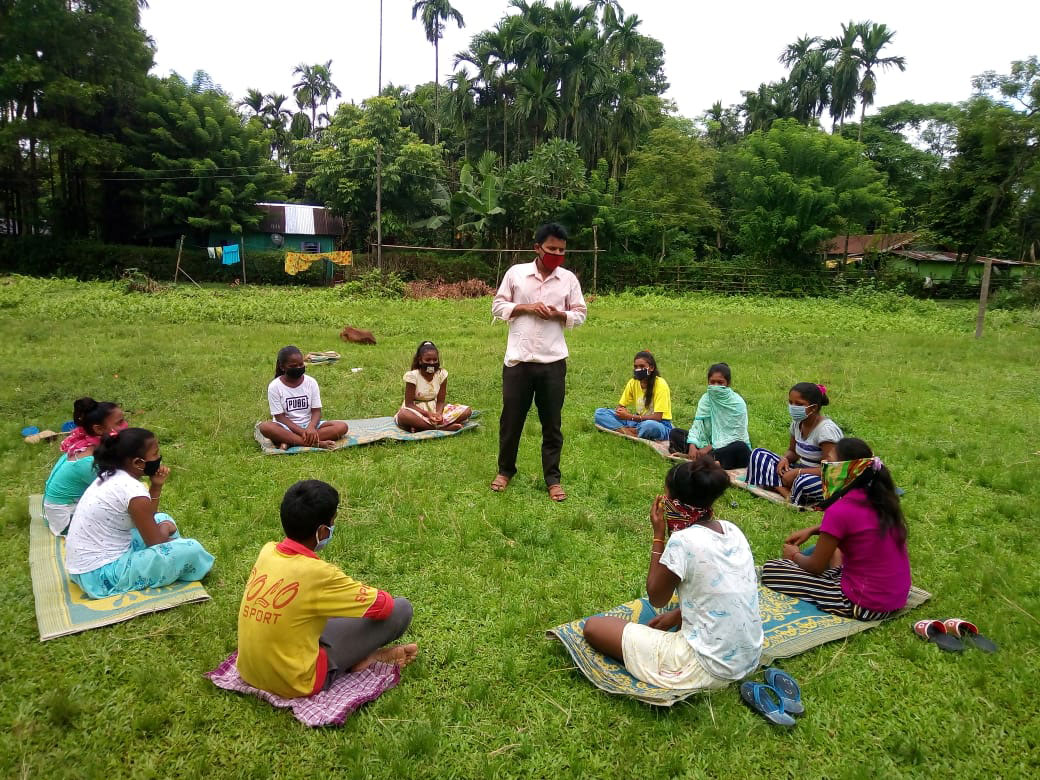
[/image_caption]
Cette situation a laissé ces jeunes sans pratiquement aucune option économique et a ouvert la voie à des groupes de trafiquants organisés pour attirer les enfants et les jeunes sous prétexte d’opportunités d’emploi.
Le confinement du printemps 2020, provoqué par l'épidémie de COVID-19, a aggravé leur situation. Avant la pandémie, certains travailleurs des plantations de thé fermées ont migré vers d'autres États. D'autres sortaient chaque jour de leur plantation pour travailler comme journaliers.
Pendant le confinement, les migrants ont dû rentrer chez eux, et la situation actuelle ne leur permet pas de retourner travailler dans d'autres États. Sans moyen de gagner leur vie, les familles sont plus susceptibles d'être victimes de la traite et de l'exploitation.
Les filles des communautés vivant dans des plantations de thé sont vulnérables à divers problèmes de protection de l'enfance. Elles ont été contraintes d'abandonner l'école, vendues comme épouses mineures et victimes de la traite vers les États voisins pour travailler dans des conditions d'esclavage.
Des centaines de filles issues de tribus, pour la plupart adolescentes, ont disparu ces dernières années dans des plantations de thé fermées et « malades ». Outre la pauvreté, l'inégalité entre les sexes est une cause fondamentale de cette situation, les filles étant considérées comme inférieures en raison de leur rôle social.
Aide rurale, partenaire du Fonds mondial pour les enfants, travaille avec les enfants et les jeunes de la région de Dooars depuis plus de 10 ans.
[image_caption caption=”Enfants en campagne contre la maltraitance. © Rural Aid” float=””]
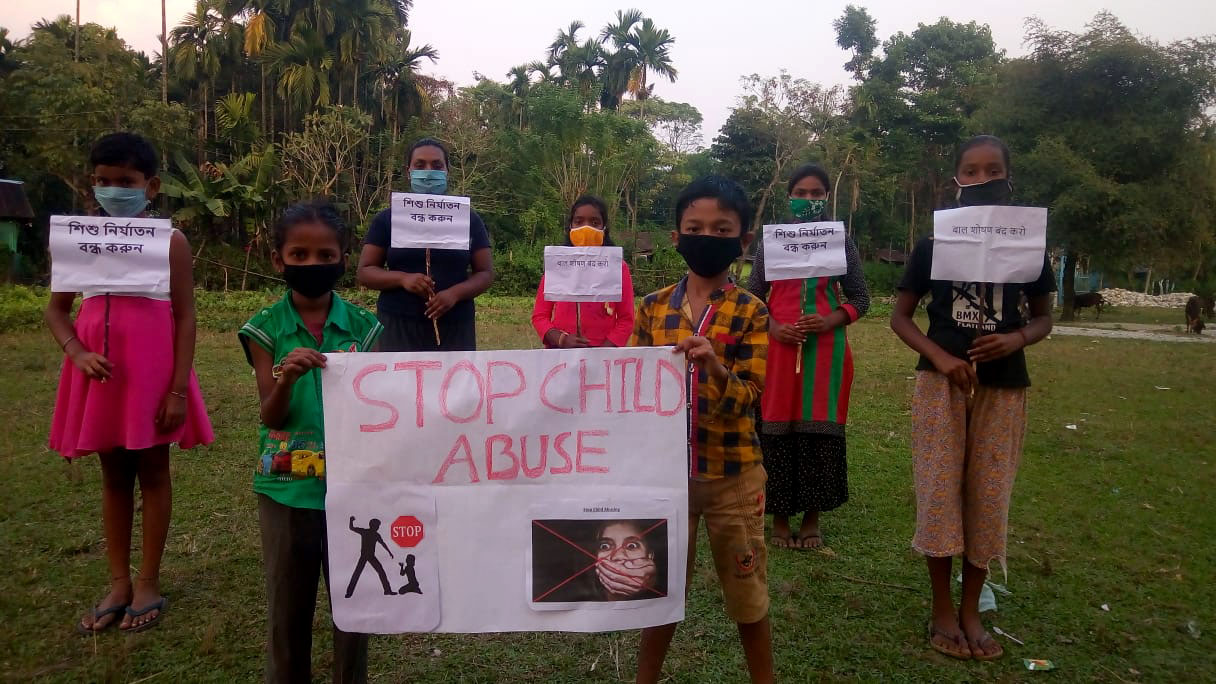
[/image_caption]
En entendant de nombreuses histoires d’exploitation brutale d’enfants disparus et victimes de la traite par des trafiquants, des malkins (directeurs de maisons closes) dans les quartiers chauds et des employeurs dans les usines, et en interagissant avec les survivants, Rural Aid a pris conscience de l’importance d’écouter les enfants et les jeunes et de les impliquer dans la recherche de solutions pour prévenir la traite des enfants.
Grâce à ses centres d'apprentissage dans les plantations de thé, Rural Aid aide les enfants âgés de 11 à 18 ans dans leurs devoirs scolaires et leur enseigne les droits de l'enfant et la protection de l'enfance, les préparant à devenir des éducateurs pour leurs pairs et, en fin de compte, des leaders dans leur communauté sur des questions telles que la traite, le travail dangereux et la violence domestique.
Rural Aid a également mis en place des groupes d'enfants et de jeunes dans les plantations de thé fermées et « malades » du district d'Alipurduar, au Bengale-Occidental, afin de permettre à ces jeunes d'être acteurs de leur propre développement, de leur rétablissement après les abus et l'exploitation, et de leur protection face aux situations dangereuses. Ces groupes proposent une série de séances sur les droits de l'enfant, qui renforcent l'estime de soi des enfants, leur fournissent des informations précises et veillent à ce que leur voix soit entendue, valorisée et prise au sérieux.
Rural Aid estime que la meilleure façon d'autonomiser les enfants est de leur offrir des espaces où ils peuvent relever les défis et planifier leur avenir. C'est pourquoi l'organisation a collaboré avec les enfants pour créer une cartographie des risques dans leurs communautés et élaborer des stratégies d'atténuation.
Les enfants du groupe Khushi (Joyeux) du jardin de thé Raimatang d'Alipurduar ont déjà fait un pas important vers leur sécurité. Les jeunes du quartier se rassemblent régulièrement sur une grande aire de jeux pour s'adonner à la toxicomanie et à l'alcool. À leur retour de l'école ou du centre d'apprentissage, les filles sont victimes de violences physiques et sexuelles de la part des jeunes toxicomanes. Ce problème est récurrent. Jusqu'à récemment, l'éclairage public était absent dans les jardins de thé, et son absence aggravait la menace pour les filles. Les cas de violences sexuelles à l'encontre des filles ont entraîné des restrictions de mobilité, des abandons scolaires, des mariages précoces et la stigmatisation des victimes.
[image_caption caption=”Des enfants savourent leur exploit sous l’un des nouveaux lampadaires solaires. © Rural Aid” float=””]
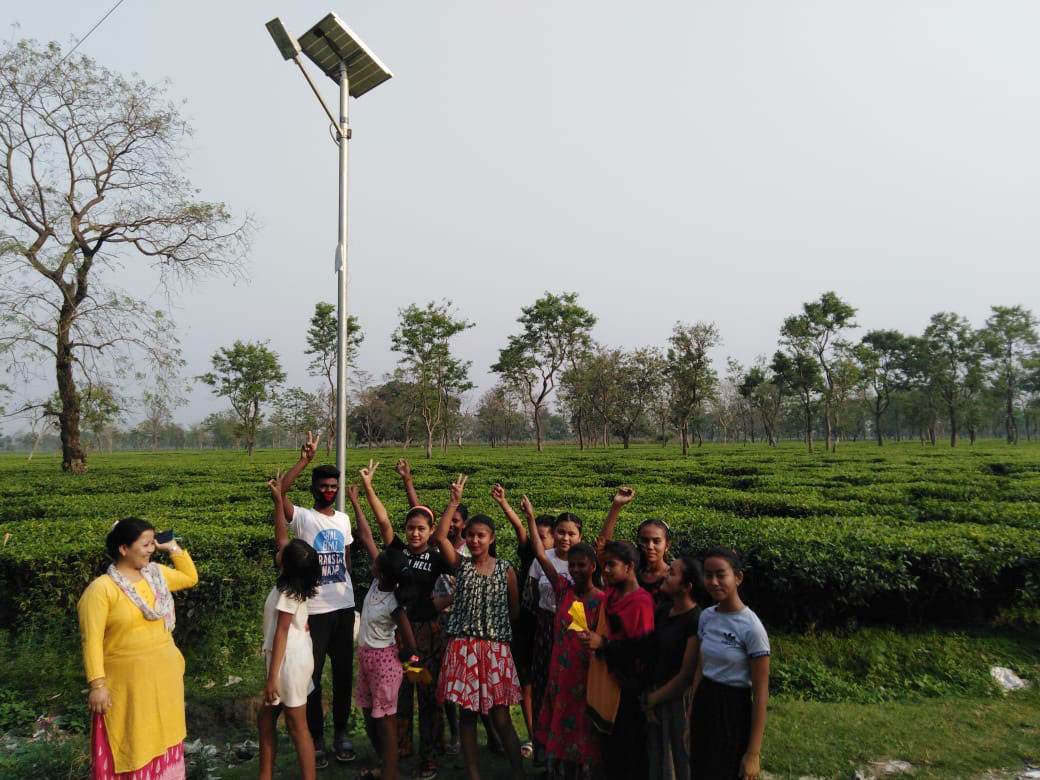
[/image_caption]
Pour résoudre ce problème, le groupe d'enfants a rédigé une demande expliquant la situation et l'a soumise au gouvernement local pour demander l'installation de lampadaires afin d'assurer leur sécurité.
Après quelques semaines, les autorités ont inspecté le quartier, écouté les enfants et installé quatre lampadaires solaires. Les filles se sentent désormais plus en sécurité pour se rendre chez elles et en revenir le soir, et les membres du groupe d'enfants ont gagné en confiance, car ils comprennent qu'une participation active peut changer le monde qui les entoure. Cette expérience positive a aidé les enfants à développer leur résilience et leur capacité à s'épanouir.
Grâce au mentorat de Rural Aid, les enfants et les jeunes ont commencé à lutter contre la discrimination sexuelle dans leur propre vie. Nishita* (19 ans), Roma* (18 ans) et Surya* (15 ans) sont trois sœurs qui vivent dans la plantation de thé de Bhatkawa, souvent fermée, car elle est « malade ». Elles ont été élevées par leur mère, qui travaille dans la plantation.
Donner naissance à trois filles était considéré comme une malédiction, et leur mère a donc été confrontée à de graves violences conjugales. Un jour, leur père les a abandonnés, laissant à leur mère toute la responsabilité de l'éducation des enfants.
Malgré de nombreux défis, leur mère n'a jamais cessé de les soutenir dans leur éducation. Leur fille aînée est actuellement à l'université et les deux autres sont en classe supérieure. Cependant, pendant le confinement lié à la COVID-19, il leur est devenu impossible d'aller à l'école et, comme les autres enfants des plantations de thé, ils n'avaient ni smartphone ni internet pour poursuivre leur scolarité à distance.
Il y a deux mois, ils ont ouvert une boutique de momo (raviolis) dans leur quartier de plantation de thé afin de payer leurs frais de scolarité et autres frais annexes. Nishita accompagne également les enfants du quartier et soutient sa mère en tant que soutien de famille.
« Nous voulons montrer à notre père que les filles peuvent aussi réussir et être les piliers de l’avenir », a déclaré Nishita, avec la plus grande confiance.
Rural Aid estime que Nishita, Roma et Surya filles avec une forte détermination peut créer des centaines d’acteurs du changement dans la société !
*Les noms ont été modifiés pour protéger l'identité des participants au programme.
Photo d'en-tête : les sœurs Nishita, Roma et Surya dans leur boutique de momo (raviolis) dans un quartier de plantations de thé. © Rural Aid
Rural Aid fait partie du GFC Initiative de lutte contre la traite des enfants en Inde, qui œuvre pour lutter contre la traite et le travail dangereux en Inde en s'attaquant à leurs causes profondes, en fournissant des services directs aux enfants à risque et touchés et en aidant les acteurs locaux à prendre des mesures collectives.

